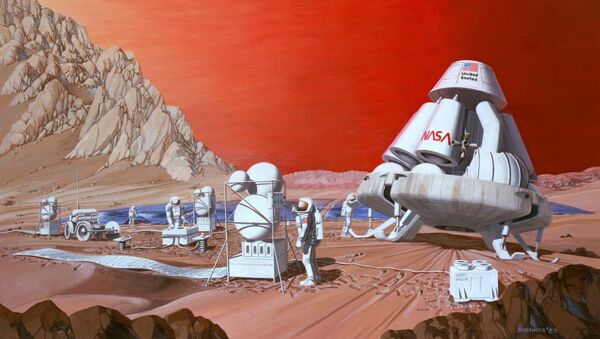As NASA is looking to take the first humans to Mars withn the next two decades, researchers warn that astronauts could be exposed to dangerous amounts of radiation that may lead to critical performance deficits, including an increased risk of cancer.
Why Does Space Radiation Matter?
Those who venture far beyond Earth into deep space should expect to be constantly bombarded by high-energy radiation coming in two ways: from injections of charged particles from the Sun and by galactic cosmic rays that originate outside our Solar System.
The Earth’s magnetosphere – a giant magnetic bubble generated by the planet’s magnetic field – as well as the atmosphere block most of the particles.
This protection gets weaker farther away from the Earth: astronauts aboard the International Space Station receive doses 250 higher than on the planet's surface, and the impact on the human body in interplanetary space could be hundreds of times greater.
What Are the Health Effects?
A recent NASA-funded study has suggested that a Mars-bound trip would face radiation so virulent that it could damage the space pioneers’ cognitive faculties.
The researchers exposed 40 mice to low doses of radiation every day over a span of six months in what seems to be the first such simulation of a deep-space trip. Previously, when studying the health impact of radiation, scientists would give test animals acute doses over shorter periods of time.
They found that low-dose rate particle radiation elicits “anxiety-like behaviour” and produces “long-lasting behavioural deficits” in mice, damaging their ability to learn and remember.
Specifically, the anxiety was found to be so overwhelming in some mice that they would display “freezing behaviour” during the tests, staying immobile for one second or more.
The study warned that at least one astronaut in a five-member Mars crew could return to the Earth with “severe deficits” in cognitive function.
During the spaceflight, the astronauts’ ability to respond effectively to stressful situations could be damaged, the research team warned.
“In the long term, the nature of the radiation environment in space will not deter our efforts to travel to Mars, but it may be the single biggest obstacle humankind must resolve to travel beyond the Earth’s orbit,” they concluded.
How Has NASA Responded?
However, NASA’s chief health and medical officer has downplayed the warning, arguing that the mice were exposed to higher amounts of radiation than astronauts would face en route to Mars.
“With dosages that we are expecting with a Mars mission, I'm not expecting to have a massive amount of cognitive decline in astronauts,” J.D. Polk, who previously worked as assistant secretary of the DHS, told NBC News.
He said: “Is there a high risk that they're going to come back with horrible cognitive decline and forget how to push the red button for reentry? No.”
But Charles Limoli, the study’s lead author and professor of radiation oncology at UC Irvine, begged to differ.
“I'm not sure what literature Dr. Polk is reading, but I don't agree with the context he places our work in — and I don't agree with his statements,” he said.
Polk still acknowledged the importance of the study and said he wanted to make sure that the astronauts are protected.
What Action Has Been Taken So Far?
This issue has troubled scientists for quite a while already. A 2015 and 2016 study by Charles Limoli and his colleagues found that radiation exposure could elicit dementia-like effects in astronauts.
NASA has already started developing technology to shield astronauts from space-borne radiation.
The agency will test a polyethylene radiation protection vest, called AstroRad, on two phantoms during the upcoming Orion unmanned lunar flyby.
The Orion spacecraft will also be equipped with a radiation-sensing instrument that would alert the crew in case of a radiation event. In such a scenario, the astronauts will have to take shelter in the centre of the crew module, which is designed to store supplies, and shield themselves with stowage bags.
Another way to fight the health threat can be found in hydrogen, boron and nitrogen, which may be used for shielding spacecraft, but future research is required in this area.
NASA doesn't want to use heavy materials like lead for shielding spacecraft because the incoming space radiation will suffer many nuclear collisions with the shielding, leading to the production of additional secondary radiation.
NASA’s research physicist, Tony Slaba, explained in 2017 that the agency “doesn't want to use heavy materials like lead for shielding spacecraft because the incoming space radiation will suffer many nuclear collisions with the shielding, leading to the production of additional secondary radiation.”



